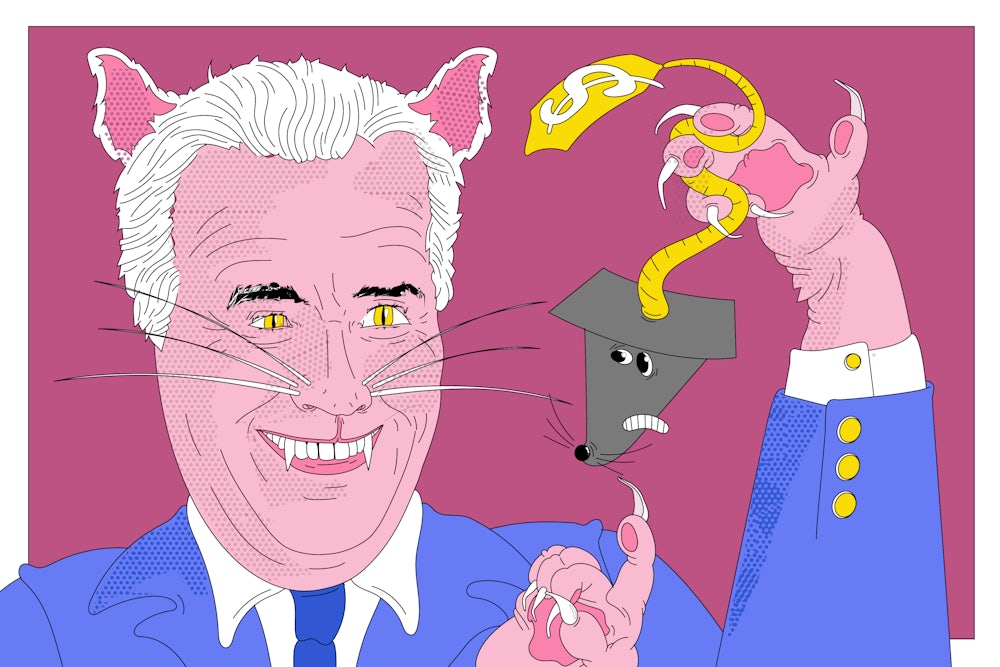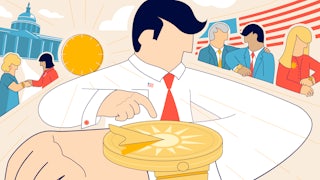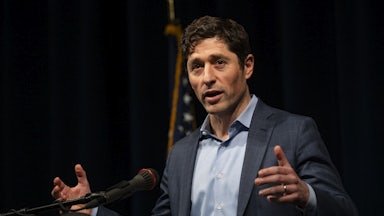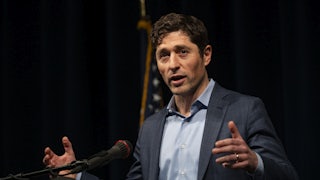Since the 1990s, student loan debt in the United States has ballooned to the point that the numbers sound like a mean joke: As of May 2022, the outstanding balance of federal education loans topped $1.6 trillion. But as huge as that figure is, we’re not powerless in the face of it. In his campaign for president, Joe Biden supported the immediate cancellation of a minimum of $10,000 of student debt per person. On episode 50 of The Politics of Everything, hosts Laura Marsh and Alex Pareene talk about why the Biden administration should follow through on its promise—and why Democrats seem so reluctant to get behind the policy. Guests include Astra Taylor, a frequent contributor to The New Republic and a co-founder of the Debt Collective, and Ryan Cooper, the author of How Are You Going to Pay for That? Smart Answers to the Dumbest Question in Politics.
[News clip of Elizabeth Warren speaking]: “Millions of people need their student loan debt canceled. Mr. President, today would be a great day to cancel $50,000 in student loan debt for tens of millions of people across this country.”
Laura: In May, Senator Elizabeth Warren urged Joe Biden to follow through on a campaign promise.
Alex: In his run for president in 2020, Biden supported an immediate cancellation of a minimum of $10,000 of student debt per person.
Laura: Two years later, that still hasn’t happened.
Alex: The administration has taken some limited steps to alleviate student debt. They extended the pandemic-era pause on student loan repayments until August of this year, and they’ve tried to make some existing forgiveness programs actually work.
Laura: Under one of those programs, the Education Department canceled $5.8 billion of debt held by people who attended Corinthian Colleges, which was a chain of for-profit colleges that collapsed in 2015.
Alex: That doesn’t come close to Biden’s original pledge. Why the reluctance to simply write off $10,000 per person?
Laura: Why haven’t we canceled student loan debt yet? I’m Laura Marsh.
Alex: I’m Alex Pareene.
Laura: This is The Politics of Everything.
Laura: Our first guest is Astra Taylor. She’s a filmmaker, writer, and political organizer, a frequent contributor to The New Republic, and a co-founder of the Debt Collective. We’re talking to Astra about the extent of the student debt crisis and the case for canceling it. Astra, thanks so much for joining us.
Astra Taylor: Thanks for having me.
Laura: Give us an idea, to start with, of who has student debt. Can you give us a picture of a typical borrower?
Astra: Forty-three million people have student debt in this country. The average student debtor did graduate from college, but 40 percent of student debtors did not. That means that they’re holding student debt without the benefit of a degree. They’re all ages. Sometimes people tell us, “Oh, you’re fighting for the kids of the Debt Collective.” That’s really not the case. The fastest-growing group of student debtors is actually older people. We are seeing a lot of seniors having their social security garnished because of default. Student debtors come from all walks of life. They’re young, they’re old, they’re Black, they’re white. What they all are is not rich.
Laura: You mentioned that people are sometimes carrying these kinds of debts for decades. What are the costs of being saddled with debt beyond making the monthly payments? What does it mean in real terms, in practice, over a career or a lifetime?
Astra: Many people who are on the plans that the government offers—they’re called income-driven repayment plans—end up paying way more than people in other payment plans, because the term of the loan is extended to 20, 25 years. What that means for them in their daily lives is they’ve got this horrible debt-to-income ratio. Even though their monthly payment might be set at basically zero because they’re so poor, their debt-to-income ratio is bad. Their credit score is likely bad. Even in situations where people are technically paying a small amount to the government, that has these other consequences. People end up paying much more for other forms of credit. You end up paying more on a credit card, you end up paying more for other loans, it’s harder to get a mortgage if you have a high debt-to-income ratio. There are all of these negative consequences for people who are holding these debts.
Alex: I appreciate that you pointed to the sort of stereotypical idea of student debt as being held by privileged young people who went to elite colleges. In reality, as you said, 40 percent don’t even have a degree from anywhere—and yet they have debt. I think Laura asked who the typical debtor is. There is no one typical debtor: If you’re counting millions of Americans, every person is burdened by this.
Astra: It really is. We see that in the Debt Collective’s membership. We are a union for debtors, most of our members have student debt, and it’s a very diverse group. At every new member call there’s someone who should be in retirement. There’s somebody who is 84 who showed up in a new member call the other day. The idea that student debtors are somehow the elites of society is bunk. In fact, 99.7 percent of student debtors did not attend Ivy League schools. You can bet that those people who are graduating from elite schools with debt are the poorest kids in those institutions, which disproportionately serve children of the one percent. There are a lot of stereotypes that we’re having to debunk as we engage in what is becoming quite a heated political battle.
Laura: It’s a heated political battle, and there is some prospect of Joe Biden stepping in and doing something here. Can you give us a sense of where things stand with that?
Astra: I mean, by all accounts—and this certainly feels true—he did not want to run on student debt cancellation. He was forced to. He still seems to be quite reluctant, but we do seem to be reaching a sort of tipping point. What has been floated is $10,000 of debt relief for households making under $150,000. You know, I think it’s really important to keep in mind what his campaign pledges were. He pledged, actually, to cancel an immediate minimum of $10,000 for every borrower—not means tested, not income capped—and to cancel all the undergraduate debt of people who went to public universities and public and private historically Black colleges and universities. He’s far from keeping even his inadequate campaign promises. Nevertheless, I think the fact that we’re facing the music that student debt cancellation is a reasonable thing and a necessary thing is progress.
Alex: I think we should talk about to whom this money is owed and how Joe Biden can cancel it essentially with the stroke of a pen.
Astra: Part of why we have made student debt such a big focus strategically is because there is literally a magic button that can erase the vast majority of it. Over 90 percent of student debt is federally secured. The government is the lender and the debt collector. There are loan servicers who get these juicy servicing contracts and are profiteering off of this, but ultimately it’s in public hands. That means that the federal government has the ability to cancel it. The main authority that we’re focusing on in the broader student debt fight is called “compromise and settlement” authority. The Department of Education is not the only agency that possesses this authority, but the logic is basically that if you issue debt, you have the power to not collect it, to cancel it. If I lent one of you 20 bucks, I don’t have to collect on it. We are pushing the administration to use the authority it clearly possesses. This was authority written into the 1965 Higher Education Act, which a man named Joe Biden voted to reauthorize multiple times in his long career as a senator. Congress has already granted this authority. We’re not saying, “Hey, do some crazy executive overreach.” We’re saying, “This is power that you possess; use it the way it’s supposed to be used.”
Laura: In the last couple of years, there has been a moratorium on collecting some of this debt anyway, because of the pandemic. What are the lessons from that experiment?
Astra: Do you want to know what I think the sad lesson is? Then we can get to the happier ones.
Laura: Go with sad first.
Astra: The sad lesson is that if Biden had been the president when Covid-19 hit, I don’t think that the Democrats would have done such a big, bold student loan payment pause. Now Donald Trump’s payment pause was imperfect. It left off quite a significant chunk of borrowers with an older kind of loan, people with private student loans. But it really was just a blunt pause for tens of millions of debtors. I think the Democrats would have tried to wheedle, tried to divide people up into the worthy and unworthy.
Alex: They would have done means testing.
Astra: A means-tested pause, yes. The thing is, this pause has given us a bit of power in the movement, because now that those loans are paused, nobody wants to turn them back on. We’ve fought for something like seven payment extensions. There was one at the end of last year where the Education Department said, “This is the all-caps FINAL extension. We’re not doing this again.” Debt Collective was threatening a big protest, and I literally got a call from the White House on a Wednesday morning before Christmas saying, “Actually, we’ve got good news for you: We’re extending the payment pause again.” They’ve now set the date of August 31, which is right before the midterms. The pause has shown the American public that the pause is possible. These loans don’t have to be collected. Also, the sky hasn’t fallen without that revenue. It hasn’t.
Alex: It would also seem politically very odd to resume these payments immediately before a midterm election. I feel that the one thing Washington has shown us over the last several years is that what it likes better than solving crises is delaying crises and then just permanently trying to delay them.
Astra: Our slogan in response to the payment pause was, “You can’t pause a crisis.” We are living in the aftermath of a million fixes and tweaks to the student lending program. That’s what income-driven repayment plans are. I’m sure the listeners have seen the headlines about the public service loan forgiveness, which was rejecting 99.7 percent of applicants, and they fixed it, and then it rejected 99.3 percent.
Alex: Explain that really briefly. It was a deal where if you go into public service, eventually your debt gets forgiven, and it just didn’t work—for anyone, right?
Astra: Let’s say I’ve gone to law school and I have $250,000 of debt and I’m going to work as a public defender for $50,000 or $45,000 a year. At the end of 10 years, I think they’re going to write that off, and then … it doesn’t happen. And it doesn’t happen for 99.7 percent of people in that boat. The same thing with the income-driven repayment plan. Remember I said that they lower your payments and extend the life of the loan? Well, the Government Accountability Office just did a big report a couple months ago (if that) and said, “Oh my gosh, the number of people who’ve gotten this relief”—this quote-unquote forgiveness—“was 157 people,” if I remember correctly. And millions are enrolled—
Laura: In the whole country! You could get them all in one room—not even a big room!
Astra: You could get them on Zoom!
Astra: That’s why we’re saying, “Just fricking stop it.” They actually have immense power to do the right thing. I think it would be good for the soul of the Department of Education if it actually was about education and it wasn’t actually one of the country’s biggest banks and biggest debt collectors.
Laura: You’ve mentioned several times how much worse this problem has become in recent decades. What was the turning point, and what made it so much worse in the early 2000s?
Astra: In the late ’90s, federal student debt was so trivial that the government didn’t even measure it. This is actually just a really recent phenomenon. There are various factors contributing to it. One is that we have substituted education policy for labor policy. This was a bipartisan thing. It was like, “We’re not going to invest in good jobs. We’re not going to strengthen the labor movement to get the minimum wage up. We’re going to tell people it’s their fault they’re poor and tell them to go to school and get a degree. Oh, and if they go to for-profit colleges, that’s fine too.” That’s where hundreds and hundreds of thousands of people went, mostly people who are poor and who are Black and brown. The great recession was also a major factor in the explosion of student debt, because when times are tough, people feel that they have to go to school to try to better themselves to get out of that. All of these factors have colluded to drive people into higher education, at a cost that is absolutely unsustainable and is breaking people. We’re not seeing the same uptick in this downturn—what do you guys call this moment of economic confusion we’re in?
Alex: It’s a weird moment. First of all, a lot of people learned their lesson about taking out money to get a degree. Also, there are enough jobs out there. I just read a story about people choosing to work rather than go to college. This moment is very odd, but that’s a logical response to the last 20 years of education policy and labor policy.
Astra: I think that’s actually why student debt cancellation is more popular with people who never went to college than people who went to college. You’ve got all these pundits, especially on Twitter and stuff, going like, “Aren’t people going to be mad when somebody’s debt is canceled? You’re going to enrage the working class!” or whatever. What you’re actually seeing is a huge number of people who never went to college going like, “Yeah, right on, cancel it, because that’s why I didn’t go to school and that’s why I don’t want my kids going to school. This isn’t working.”
Alex: The politics of this are very interesting in that sense, because there are certainly a lot of people who had student debt but because their careers went so nicely they didn’t have to worry about it. They might be more unwilling to forgive it than people who didn’t go to college at all because of the expense.
Astra: I think the people most invested in the meritocracy are the most reluctant to cancel student debt.
Alex: I agree completely.
Laura: It’s funny because with most disasters that people undergo—like a really bad health event or some, you know, horrible accident—their reaction is, “I don’t want anyone else to have to go through this. Let’s implement some kind of reform to make sure this never happens again.” But with student debt, the talking point you see is, “I had to go through this, so everyone else should. It would be unfair to spare anyone in the future.”
Astra: This is where I sometimes get on my high horse: I’m like, “I paid off my student debt, I don’t think anyone else should have to,” which is true. I think we just have to say what you just said, which is, “Hold on. Isn’t social progress about other people in future generations not suffering just because we had to suffer?” Joe Biden gave a speech a couple Saturdays ago, a commencement speech for the University of Delaware. He said, “I too used to struggle with my student debt. I struggled to pay the $300 a semester for tuition.” But even adjusted for inflation, that’s like a fraction of what students at the University of Delaware are paying today. So I think we can appeal to people’s empathy and try to remind them to be kind. We can also give them a bit of historical context and say, “Hold on, Grandpa Joe definitely didn’t have to pay this much money to go to college, so why should people today have to be burdened with this debt and essentially mortgage their futures for the same opportunity?”
Laura: Thanks so much, Astra.
Alex: Yeah, thank you.
Astra: Thanks for having me.
Laura: The benefits of cancellation to student debtors seem obvious. They won’t have to pay interest on exploding balances; they’ll have more money for other expenses; their credit scores will improve.
Alex: But the effects of canceling debt or choosing not to aren’t just material. They’re political, too. After the break, we’ll talk about why the Biden administration seems so reluctant to follow through on a campaign promise and whether that reluctance is based on sound economics or a lack of political will.
Alex: Ryan Cooper is a managing editor at The American Prospect and the author of the book How Are You Going to Pay for That? Smart Answers to the Dumbest Questions in Politics. Ryan, thank you for talking to us today.
Ryan Cooper: Happy to be here.
Alex: We’ve been talking about student debt forgiveness. We’ve been talking about some of the common arguments against doing it. We haven’t really gotten into the question posed by your book. Not that your book is about this subject, exactly, but we haven’t gotten into the question of “How are we going to pay for it?” We hear that there’s a trillion dollars of student debt. How can we possibly afford to forgive it?
Ryan: Well, I think that’s a misleading question, and how it’s posed—not by you—
Alex: I was kind of being misleading on purpose there, so you can feel free to call it that.
Ryan: Dang it, Alex! When you’re looking at debt like this, the question is, “Is it going to be paid back or not?” The answer to that question—not in every case but in a large and growing share of that debt—is, “No, it’s not going to be paid back.” The question is, “Who’s going to take the loss?”
Alex: So we have, basically, a political problem: “We’re not going to see that money again, so on whose backs are we going to settle this?” But what we’re talking about is budgetary numbers in future expected federal revenue, right?
Ryan: Yeah. In fact, one of the reasons they sold the student debt subsidies in the first place was that it was going to be a moneymaker for the federal government—that they were going to give these loans out, and then people were going to earn human capital, they were going to make a lot more money, and then they were going to repay the loans with interest, and it was going to reduce the deficit. This was 1990s gold. People loved to hear this kind of thing. The problem is that it just didn’t happen. Wages were stagnant, and the debt balances did not go away like they thought they would. You’re left with this question of who’s holding the bag.
Alex: That gets to what I think is the political question here. We want to talk about the effects of debt relief in a bit, but to get to the political part of it: I do think that narrative that you just described and that sales pitch—“We will invest in young people, they’ll get degrees, and then because a college degree is a magical ticket to a high income, they will repay the government and we will reduce the deficit”—that was supposed to be how the policy worked. We have basically now run the experiment. We’re at the part of the experiment where you’re checking if it worked or not. It seems to me that it didn’t work. It also seems to me that it’s really hard to get the people who believed in that experiment to admit to themselves and to the country that it didn’t.
Ryan: The education fetish has many parts to it. You saw the human capital theory that education is going to solve inequality, that we’re going to get higher wages for the working class if people can get degrees. You also saw that education is going to solve poverty. But when you look at the statistics in that realm as well, it didn’t work. You’ve massively increased the educational attainment of the American population over the last hundred years. Over that time, the impact of education on poverty has been nothing. What solves poverty is the welfare state. I think this goes to show you the Democrats’ desperate searching for some sort of class solvent that will absolve them of having to fight with Republicans or the donor class. To be fair—to give Joe Biden his due—they did attempt a great big expansion of the welfare state with the child tax credit, but that was killed by members of their own party, explicitly for the reason that it gave the money to poor people who would, said Joe Manchin, spend it on drugs.
Laura: Student debt cancellation is something they still could do. Why do you think they are not?
Ryan: I have only psychological suppositions. Arguably, Biden could do this without anyone else’s say so. He could just write it off and be done with it. I think you see a typical Democratic hesitancy, an unwillingness to do aggressive, boundary-pushing things if they can possibly help it. That smacks to them of Trump, or, worse, the socialist left. I think maybe more importantly, you see the class split in the Democratic Party, and a desire to discipline the young left, which you see from a lot of people like Josh Barro, Matt Yglesias—that type of person. The student debt football has become a sort of a weapon in that internal coalition argument.
Alex: It’s taken on a symbolic importance beyond the policy, which is, Which side is going to win this fight for the Democratic Party?
Ryan: Yeah. It is the case that young college graduates are a central constituency of the new, upcoming socialist groups. They’re arguing for student debt cancellation, and so telling them to shut up is a really popular thing. If you are dedicated to keeping AOC and all of the grimy hippies away from the levers of control inside the Democratic Party, casting student debt forgiveness as some sort of handout to Hamptons millionaires or whatever is a pretty potent rhetorical weapon.
Alex: Or Oberlin women’s studies grads who don’t want to pay their bills.
Ryan: “Why didn’t you get an engineering degree, you stupid feminist?”
Alex: It’s funny: You bring up AOC as a representative of the leftmost flank of the Democratic Party, but the politics on this have gotten very mainstream very quickly, which I think makes the White House’s ambivalence about it even odder. I know that your magazine, The American Prospect, has actually done some reporting on the debate within the party and within the White House. Chuck Schumer—no socialist he—spent Biden’s first year in office saying, “You got to cancel debt for people. You said you were going to do it. You’ve got to do it.”
Ryan: These things get mixed up. It definitely is not the case that it’s only Hamptons millionaires who would benefit here. I think Schumer is not a super accurate retail politician, but he’s more of a retail politician than Matt Yglesias. I think he sees that this is a winning issue for his coalition. It’s just the internal dynamics—you know, if Republicans had a thing like this, where a section of the party wanted something that maybe didn’t poll great, like it wasn’t a thing that was a super slam dunk, 90 percent approval, everyone loves it, they would just do it right away. They would sort of narrow-cast propaganda to the people who benefited, and then they would shut up about it. They would move on to Benghazi 2.0 or something.
Laura: It’s interesting—what you’re describing is basically that they have a political program and are able to achieve multiple goals. I think when we’re talking about student debt cancellation, we’ve been talking about it as, like, “This is one of the few things Joe Biden can still do.” Maybe the mistake is to talk about just being able to do one thing, because political parties tend to be successful when they can do lots of things.
Ryan: Yeah. I mean, it’s the kind of thing where Republicans—for all their faults—act like a political party much more than Democrats do. They have their agenda, they try to achieve their agenda, and then they move on to the next thing. They don’t wrap themselves around the axle of their own coalition for months and months, which is what the Democrats did with Biden’s Build Back Better agenda. This is a debate you could have solved with a couple of administration economists and aides and like 15 minutes, I think, on day one of the new administration: Do the write-off; onto the next thing. Ultimately, you know, I think it does have to come back to Biden. He’s in charge here, and if he wanted to make this happen, he’s the top dude. He makes the decision whether you’re going to write this executive order or not. He hasn’t shoved one of his economists up against the wall with his hand behind his back and said, “Tell me that it’s going to be a good thing, and now go on CNN and say it.” He just hasn’t done it.
Alex: I’m sure there are economists in the White House who have been saying that this would be economically a good thing. Let’s get into that: This debt has been frozen for a lot of borrowers for a long time, but forgiving it—what do you think of the economic impact of that?
Ryan: The latest number that’s been bandied around is $10,000. You see people being kind of dismissive about that, for the reason that a lot of people have debt well into the six figures. But that would wipe out about a third of all the balances. It would cut another quarter or something in half or more. It would be a very significant amount of debt relief for those people. Economically, you’re talking about putting a couple hundred dollars a month—something like that—into the pockets of people. It would be—this may be factoring into the administration’s thinking—anti-inflationary to restart the payments and not cancel any debt, because then you would be forcing people to send more money to the government. It basically would be a huge tax increase.
Alex: A tax increase on indebted people.
Ryan: Yeah. Conversely, if you think that the inflation problem is not primarily caused by overspending—especially not overspending among a relatively small group of people—then they would have more money, they would have less debt so their credit would be better, they’d be able to borrow money to buy possibly a car or a house. This would be a pretty big economic lift for a fair number of people, though if it were up to me, I would say, “Start with $50,000 and go from there,” for the reasons that I mentioned previously—that from a practical matter most of that debt is not getting paid off.
Laura: What do you think the political consequences will be if Biden doesn’t do anything about this?
Ryan: I think that would be the worst of all possible worlds. You will have dangled this little carrot of “We’re going to give you something” right in front of the noses of some of your most loyal voters, sort of a new core constituency of the party: college graduates. They used to be quite heavily Republican back in the day. Then you snatch it away for reasons that are just inexplicable and a betrayal of the promise that he made. The whole party looks so pathetic and helpless, you know—just a victim of its own stupidity and incoherence.
Alex: I find the political part of this kind of baffling, because I feel like we can talk about Democrats operating in fear of backlash, maybe they’re operating in fear of resentment and backlash that student debtors got a handout, maybe that’s behind part of it, but if you were operating like a normal political party, you would say that the people who will feel resentful about that are not our political base.
Ryan: College graduates under 45. That’s like Biden’s winning-est category of people—up there toward the top, at least. To just stick a thumb in their eye … I mean, a little of the good old Democratic Tammany Hall spirit, I think, would go a long way here. It’d be like, “No, we’re in office to give material goodies to our constituents.”
Alex: Embrace the handout!
Ryan: Why else would you get in the game, baby? This is the entire point of holding political office.
Alex: Let’s forgive student debt and bring back patronage jobs. That’s my platform.
Ryan: Exactly.
Laura: It feels like this would go beyond just making the people who get that relief happy, though, because I think that to a broader swath of voters it would just prove, like, “The party that I’m aligned with can do stuff because it did one thing.”
Ryan: To your point, it is incredibly dangerous for the party not be able to do anything at all, even really with respect to executive actions, and to feel like it is pointless to vote for them except to keep out the Republicans—that Democrats are not going to really try to do anything to help you, and the best that you can hope for is that for a few years, Republicans won’t be running anything. This is just the kiss of death for a political party. It’s just not a very great motivation, especially for those younger voters we’ve been talking about who are not so attached to the political system and don’t have a lot of loyalty to the party as a whole and expect to get something.
Alex: One reason Democrats tune out quote-unquote younger voters is that they’re less consistent than older voters, but the way you make a voter into a party loyalist is to have them associate you being in power with something good happening for them—I would think.
Ryan: Yeah. There’s such a sense, especially among younger people—the under-45 high school and college students—that the American constitutional republic is just broken. I think it’s a terribly dangerous attitude to enable and allow to fester by blocking your own party’s agenda or refusing to use any of the tools of the executive to help your constituents—to prove both that your party can do things for the people who vote for it, the sort of social contract for a political party, and also just to demonstrate that the government is capable of functioning still in a way that it seems it maybe sort of isn’t. But at least in the case of student debt, that’s up to Biden. He could make that happen tomorrow.
Laura: Well, that reinforced all of my misery about the Democratic Party.
Alex: Yeah, we hit on the main reasons why everything is awful, so I appreciate that, Ryan. Thank you, as always, for making me feel great about the American experiment. It was a pleasure talking to you today.
Ryan: It was a pleasure being interviewed.
Alex: The Politics of Everything is co-produced by Talkhouse.
Laura: Emily Cooke is our executive producer.
Alex: Myron Kaplan is our audio editor.
Laura: If you enjoyed The Politics of Everything and you want to support the show, one thing you can do is share this episode with a friend.
Alex: Thanks for listening.






